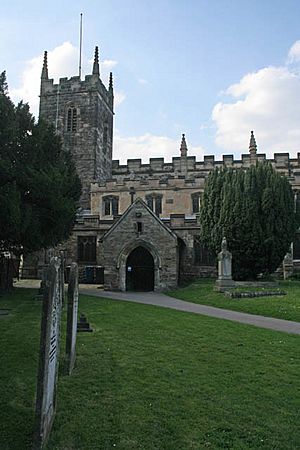St Giles Church, West Bridgford facts for kids
Quick facts for kids St. Giles Church, West Bridgford |
|
|---|---|
 |
|
| Lua error in Module:Location_map at line 420: attempt to index field 'wikibase' (a nil value). | |
| Country | England |
| Denomination | Church of England |
| Churchmanship | Open Evangelical |
| Website | www.stgilesparish.com |
| History | |
| Dedication | St. Giles |
| Architecture | |
| Heritage designation | |
|
Listed Building – Grade II
|
|
| Designated: | 13 December 1949 |
| Reference #: | 1045677 |
| Administration | |
| Parish | West Bridgford |
| Deanery | West Bingham |
| Archdeaconry | Nottingham |
| Diocese | Southwell and Nottingham |
| Province | York |
St. Giles' Church in West Bridgford is an old and important Anglican parish church located in West Bridgford, Nottinghamshire, England. It is part of the Church of England. This church is considered very special because of its history and architecture. It is officially listed as a Grade II listed building, which means it's protected because of its historical or architectural importance.
Contents
History of St. Giles' Church
The church of St. Giles has been around for a long time, since the medieval period! However, not much of the original medieval building is left today. Over the years, it has been repaired and updated many times.
One big restoration happened in 1872, led by an architect named Thomas Chambers Hine. Later, between 1896 and 1911, more work was done by another group of architects, Naylor and Sale. The foundation stone for this major restoration in 1896 was laid by Lady Byron of Thrumpton Hall. This work included building a new nave (the main part of the church where people sit) and a new chancel (the area around the altar). This part of the restoration cost £5,500 at the time.
Special Features of the Church
St. Giles' Church has some interesting old features. It still has a medieval screen that dates back to the late 1300s. A screen is a partition, often made of wood, that separates parts of the church. The church also has beautiful stained glass windows made by a company called James Powell and Sons.
The Church Organ
The church has a long history with its organs. A small organ from 1840 was bought in 1871 from St. Stephen's Church, Sneinton. This organ was later sold in 1898.
A new, larger pipe organ was then built by Charles Lloyd and Co. This organ cost £500 and was first played on November 22, 1899. Even though it was designed to have three manuals (keyboards), only two were fitted with pipes at first. An extra £300 was needed to finish the third manual.
The organ was made even bigger in 1919 when it was moved to a new part of the church called the King George Aisle. It was rebuilt twice more, first in 1951 by Henry Willis & Sons and again in 1971. Finally, in 1993, an electronic organ replaced the pipe organ. The console (the part with the keys and stops) from the old pipe organ was later used to rebuild an organ in Trinity United Reformed Church in Wimbledon, London.
Organists of St. Giles' Church
Many talented organists have played at St. Giles' Church over the years. Here is a list of some of them:
- George Gunn (1871 - 1875)
- William Stevenson (1884 - 1892)
- Miss Pemberton (around 1895 - 1898)
- James Buckland Lyddon (1898 - 1904)
- Vernon Sydney Read (1904 - 1905)
- James Buckland Lyddon (1905 - 1907)
- William Ryde (1908 - around 1912)
- Mrs Hector Tomkins (around 1912 - 1920)
- Charles Bissill Morris (1920 - 1924) - He later became the organist at Castle Gate Congregational Centre.
- Dudley Newball (1924 - 1941)
- John Gordon Wood (1941 - 1957)
- Malcolm Boyle (1957 - 1961)
- Harold Bebbington (1961 - 1965)
- Walter L Rogers (1965 - 1970)
- A Walter Esswood (1970 - 1984)
- Fred G Munday (1985 - 1995)
- Alan J Hindle (1995 - 2002)
- Andrew John Rootham (2002 - 2015)
- Dr. Paul Bracken (2015 - present)
More Information
- Listed buildings in West Bridgford
 | Jewel Prestage |
 | Ella Baker |
 | Fannie Lou Hamer |

